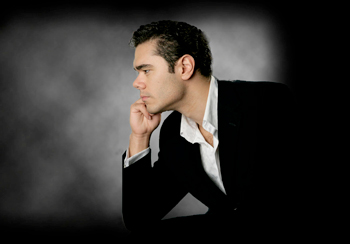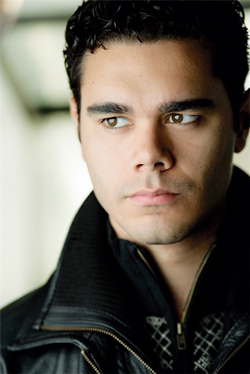by Daniel Hathaway

At 26, Madore already has an impressive resumé. He set a record as the youngest singer to win the Metropolitan Opera National Council auditions in 2010, then went on to make his Metropolitan Opera debut as Lysander in The Enchanted Island. Madore has sung the role of Don Giovanni in St. Louis, at Tanglewood under James Levine, and at the Glyndebourne Festival. In January, he sang the role of Adorio in Les Indes galantes with William Christie’s Les Arts Florissants to open the new Philharmonie Hall in Paris.
And he could have been a hockey player instead. Growing up in Toronto, Madore had his sights set on the NHL, but as he said in a recent interview, “I was lucky enough to find another vocation that wasn’t so violent.” Not so violent, but still dangerous, as I suggested when I spoke with him by phone in Zürich, referring to a Glyndebourne photo where Madore, as Don Giovanni, is hanging on for dear life while climbing up to the bedroom window of a potential conquest. “Well, I won’t get a concussion in opera, but that scene in Glyndebourne was pretty nerve-wracking. That was the steepest ramp ever. At one point, when the Commendatore arrives, I had to do a little roll-down. It was scary, but I got through it.”
When we spoke, Elliot Madore was in Zürich singing the role of Harlekin in Richard Strauss’s Ariadne aux Naxos, while “getting Pélleas et Mélisande into my head” for forthcoming performances in Zagreb and Munich, and preparing for his recital in Berea. “I don’t sing recitals as often as I’d like because I have a lot of opera engagements and it’s difficult to fit everything in. But I love lieder, chansons and songs. I was lucky enough to be free for the recital date in Cleveland. It’s a program we’ll repeat in a few weeks at the St. Lawrence Center for Music Toronto.”
On Sunday, Madore will begin his program with Robert Schumann’s Balsatzar, op. 57, followed by Schumann’s Liederkreis, op. 39, a song cycle on poems by Joseph von Eichendorff. Francis Poulenc’s Banalités, on poems by Guillaume Apollonaire, and five Charles Ives songs (The Circus Band, Ich grolle nicht, The Side Show, Tom Sails Away and Memories) will make for an intriguing second half.
I asked Madore how he got interested in singing as a career. “I was always fascinated by classical music from a young age, and knew I had an operatic-type voice,” he said. “I tried to emulate Jussi Björling and Bryn Terfel by singing along with their CDs. I had a wonderful teacher, and went to an arts high school where they suggested I audition for Curtis. From there, things just snowballed. I sang with Levine at Tanglewood, won the Met competition the next year, entered the Met’s Young Artist Program and got my first contract in Zürich.”
His career was moving so fast that Madore confesses to being a bit stunned when he walked into the first rehearsal for The Enchanted Island at the Met. “There they all were — Joyce DiDonato, Plácido Domingo, Danielle De Niese, David Daniels — singers I had been listening to since I was a teenager. I was just terrified. But they were really the nicest people, super supportive and a joy to work with.”
Madore found opening the Philharmonie de Paris in January to be “a wonderful experience. The hall is absolutely beautiful and acoustically fantastic. Like Berlin, the audience surrounds the platform, which gives you such a feeling of intimacy. The people seem extremely close but if you turn around, there’s tons of space at the same time. It was funny to see the roof and stage entrance full of construction workers, sand on the rugs, toilets unfinished. But the inside was marvelous.”
The Paris engagement underlined Elliot Madore’s versatility both in standard repertoire and early music. “French baroque music really fits my voice nicely, and it was interesting to come together with Les Arts Florissants, a very experienced group of singers. When I sing this repertoire I don’t change my vocal production, but it’s important to focus on ornamentation, the musical line and the way I use the text, trying to give the music justice with that kind of detail.”
Speaking of standard repertoire, how does Madore approach the character of Don Giovanni, a role he has sung frequently since his school days? “I did it the first time when I was 21, and the character has changed as I’ve changed. At first, I invested the role with youthful energy, but not with any sort of pacing or thoughtfulness. I just wanted to throw it out there. As I got older, I realized that Don Giovanni is emptier and sadder than I had thought earlier. Now I try to show more chinks in the armor so the audience can feel a bit more sympathy for the man. I try to make him as human as I can, an interesting character that the audience can grab hold of.”
As an afterthought — and something I’ve always wondered about — I asked Elliot Madore what the singers do during the famous 90-minute picnic intermissions at Glyndebourne. “It really makes things feel like two different operas because you have to reset, warm up and re-energize for the rest of the evening. It’s nice to have a break, but it’s also challenging, because then you have to get back into the game. But the change in the audience is fantastic. Glyndebourne patrons are incredible to begin with. They know the music and they’re very receptive. But after they’ve gone outside and had a lovely picnic with champagne and sheep grazing nearby, they’re really relaxed and open when they come back.”
Published on ClevelandClassical.com March 10, 2015.
Click here for a printable copy of this article




